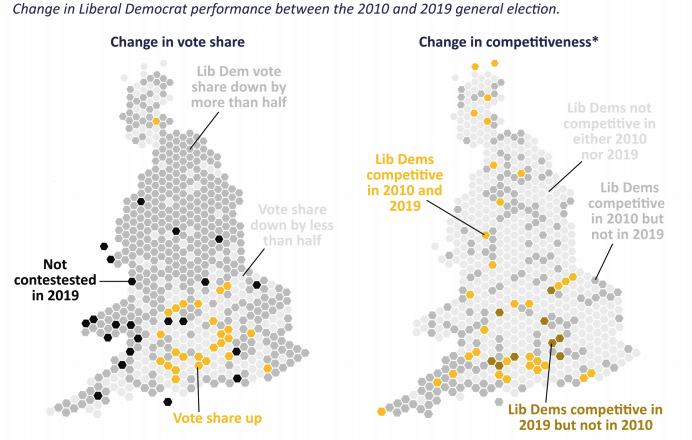Don’t read too much into the result of today’s Chesham and Amersham by-election. The Lib Dems have a track record of winning seats from the Tories in these sort of contests — only to lose them in subsequent general elections.
Much more interesting is the wider pattern of Lib Dem revival.
This is patchy to say the least. The party is still on single figures in most opinion polls. Furthermore, in almost every constituency in the country the Lib Dem vote share at the last general election was down on what they got in 2010.
However, in a handful of seats the 2019 vote share was up on 2010 — and the really interesting thing is that these hot prospects are overwhelmingly concentrated in one particular part of the country. To see where, I’d recommend a 2020 report by Tim Bale, Aron Cheung and Alan Wager for UK in a Changing Europe.
This is the key chart — a pair of maps showing exactly where the Lib Dems are doing best. As you can see it’s southern England, but not all of it. The new Lib Dem heartland is a chunk of the South which stretches westwards from London, but stops short of the West Country (the old Lib Dem heartland).

With some latitude, you could call this area Wessex. Or Midsomer Murders Country, perhaps. If you include the outpost around Cambridge, then the Golden Triangle might be an appropriate name (the other two corners being Oxford and some of London’s leafier suburbs).
Whatever you call it, there’s an obvious overlap between this region and the parts of the South beyond London that voted to Remain. But five years on from the referendum, is there more than Brexit to unite this part of this country — and give the Lib Dems a distinctive set of interests to represent?

 Main Edition
Main Edition US
US FR
FR







Join the discussion
Join like minded readers that support our journalism by becoming a paid subscriber
To join the discussion in the comments, become a paid subscriber.
Join like minded readers that support our journalism, read unlimited articles and enjoy other subscriber-only benefits.
SubscribeWould be useful to have a key to the diagrams – spots with no reason. I guess you could work it out but why try on a nice day?
Does it really matter who you vote for today? You get the same statements in different languages. More green jobs, whatever that means. More for the poor without increasing taxes. More woke – this is sapping my energy making me the opposite of woke (sleep?).
Oh for a party which says: “We will control immigration. We will make it safe in the cities again. We will allow patriotism in England – it is already allowed in Scotland and Wales.”
I wouldn’t vote for a party whose leader has pronouns in he/him/his Twitter bio.
No.